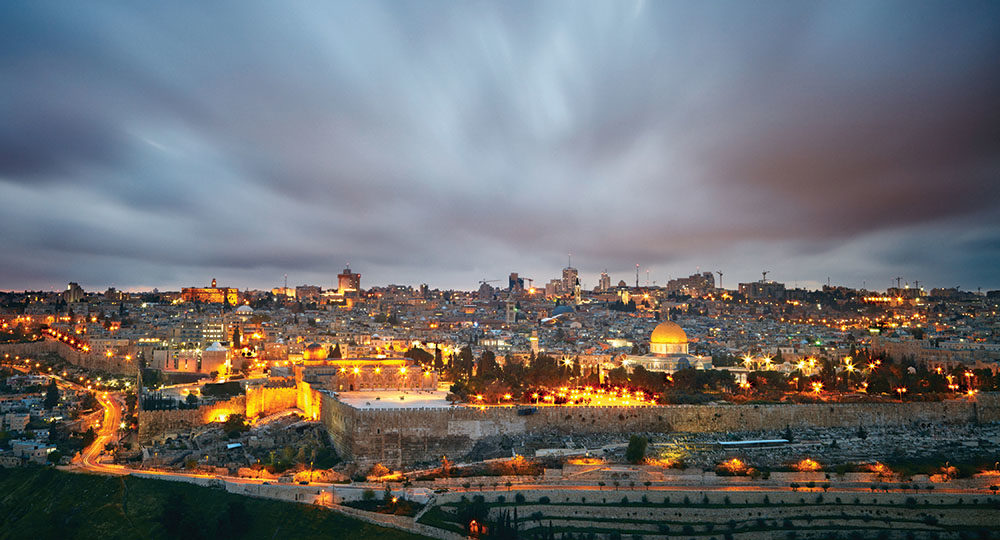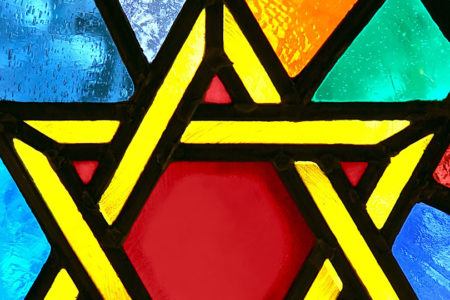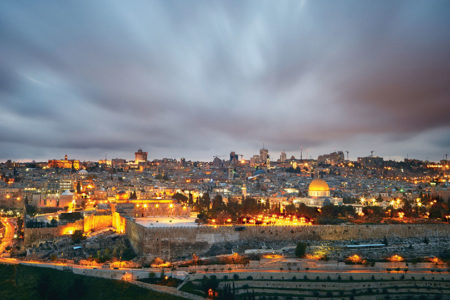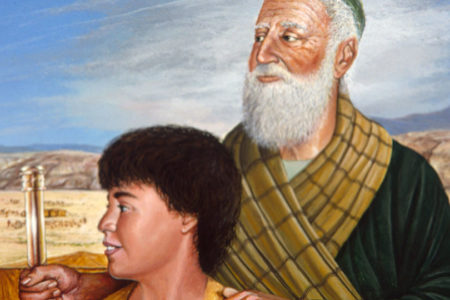Judgment on Jerusalem Zephaniah 3:1–8
Perhaps no city on earth is more loved than Jerusalem. The psalmist has well written, “Beautiful for situation, the joy of the whole earth, is Mount Zion … the city of the great King” (Ps. 48:2). God said, “This is Jerusalem; I have set her in the midst of the nations and countries that are round about her” (Ezek. 5:5). Moses, the great lawgiver, said that when God gave the nations their boundaries, He did so in relationship to Israel (Dt. 32:8). Jerusalem is the city of God, the capital of Judah, the sanctuary of spiritual life, and the joy of the whole earth to the Jew.
Never could Jerusalem’s princes or people envision its destruction, especially by her heathen neighbors. Here only had God placed His name and revealed His Law to the world. Here only was God truly worshiped. And here only stood the great Temple of Solomon, wherein dwelt God’s shekinah glory.
But the stench of Jerusalem’s moral depravity had reached the nostrils of the holy God. He no longer could tolerate the defamation of His holy name, the pollution of His sanctuary, and the oppression of the righteous. In graphic language, Zephaniah detailed Jerusalem’s corruption and her soon-coming judgment.
Woe to the City
Zephaniah continued his prophecy against Judah with a strong condemnation of Jerusalem: “Woe to her that is filthy and polluted” (v. 1). Not only was Jerusalem defiled, but she had become defiant toward God. “She obeyed not the voice” of God (v. 2), choosing instead to turn a deaf ear to the prophets’ warnings of imminent judgment. “She received not correction” (v. 2), ignoring the lessons suffered by the ten tribes of Israel and those of her own history. “She trusted not in the Lᴏʀᴅ” (v. 2) but put her faith in heathen gods, military power, her own cunning wisdom, and alliances with pagan nations. “She drew not near to her God” (v. 2), asking to be forgiven of sin and guided toward renewal. The nation had become corrupt and lacked a true desire to commune with God.
Jerusalem’s defilement led to her degradation, and she became known as the “oppressing city” (v. 1). When a city ignores God’s Law and turns to rampant immorality, it results in oppression throughout every level of society, from the rich to the poor. Isaiah recorded that the people were being “oppressed, every one by another, and every one by his neighbor,” and the children were behaving themselves “proudly against the ancient [elderly], and the base against the honorable” (Isa. 3:5).
Worthless cults and customs had flooded in from the East. Wealth gleaned through oppression filled the land. The nation was replete with idols; the people were worshiping the works of their own hands (Isa. 2:6–8). Even their facial expressions witnessed against them; they declared their sin like Sodom (Isa. 3:9). They had become totally corrupt from the tops of their heads to the soles of their feet (Isa. 1:5–6).
Lest we be quick to pass judgment on Jerusalem, consider the conditions existing in many major American cities. God’s Word has been rejected, and the warning of coming judgment receives little attention; in fact, for the most part it goes unheeded. People are trusting in eastern philosophy and the gods of military power and alliances with nations whose records on human rights are deplorable. The sin of Sodom is showing on the countenances of many throughout the country, as homosexuals parade for gay rights. Oppression between neighbors is rampant. There is a burglary every 20 seconds, a larceny every 2.5 minutes, a rape every 19 minutes, and a murder every 43 minutes in this country. The author and his wife have been robbed three times in the past 17 years. Woe to America! is the warning from God.
Wicked Citizens
Zephaniah denounced the leaders of Jerusalem as ruthless despots who cared only for their own interests. Her princes were pictured as “roaring lions” (v. 3). Princes were put in positions of power to maintain peace and provide protection for the people. But these princes abused their position by moving through Judah’s society like voracious and violent lions, preying upon vulnerable victims (cp. Prov. 28:15–16). They used unrestrained power to satisfy their passion for wealth. It is God who puts people in positions of authority (Dan. 2:21), and they are expected to carry out their responsibilities with justice and in the fear of God (2 Sam. 23:3).
A nation cannot function properly without a power structure, but power in the hands of a ruthless dictator will, in the long run, be the instrument of a nation’s undoing. Modern-day dictators, such as Hitler, Stalin, and Mao-Tse-Tung, have exacted a heavy toll upon their countries, leaving them financially and socially diminished or destroyed. Satan, working through despotic princes, goes throughout a country seeking whom he may devour (1 Pet. 5:8). Political oppression of the people by Judah’s leadership was one of the major reasons for God’s destruction of the country.
Zephaniah described Judah’s judges as “evening wolves” (v. 3). These judges or magistrates should have protected the poor, indigent, and innocent within their country. Instead they aided and abetted injustice through political oppression (cp. Amos 2:6–8; Hab. 1:8).
Wolves are clever, wily, ferocious, and merciless, always on the lookout for new victims. Like evening wolves, who slide in under the cover of darkness to grab an unsuspecting prey and greedily gulp it down, so these judges, under the pretense of law and justice, rapaciously gobbled up the wealth and property of those who came before them. They were like wolves who, deprived of food, comb vast areas looking for a meal at great risk to their own lives. The prophet said, “they gnaw not the bones till the morrow” (v. 3). In other words, they gulped down their prey, and there was nothing left the next morning. Like lawless wolves, these leaders used the law to their own advantage in order to accumulate wealth.
Micah is very descriptive concerning the abuse of Judah’s leaders. He wrote that the people were treated like cattle to be eaten. The leaders stripped off their skin, broke their bones in pieces, and chopped them up like meat to be fried in a pan or boiled in a pot (Mic. 3:3).
Amos explained how social injustice was perpetrated on the poor. The judges perverted justice by selling “the righteous for silver” (Amos 2:6); that is, the judges condemned righteous people for a bribe, or possibly sold into slavery those who would not or could not pay their debts. This was not legal in Israel (Lev. 25:39). The poor were sold “for a pair of shoes” (Amos 2:6), almost nothing. These cruel creditors “pant[ed] after the dust of the earth on the head of the poor” (Amos. 2:7). In other words, they oppressed the poor so severely that they mourned by casting dust on themselves, and then the leaders even removed the dust that the poor had placed on their heads in misery. These heartless leaders did everything within their power to destroy the judicial process of the courts, especially regarding their creditors (Amos 2:7). Jerusalem’s judges were so corrupt that they were hastening the demise of the city.
The foundation of any society is the integrity of its judicial system. When the courts become so degraded that injustice, rather than justice, is meted out, society is on the brink of total decline.
Second, Judah’s prophets are described as “light and treacherous persons” (v. 4)—“light” in the sense of being shallow, superficial, frivolous, and irresponsible in their prophecies. Thus, they were treacherous, deceiving the people by posing as true messengers from God while all the time exploiting their position for personal and financial gain. Many were drunkards (Isa. 28:7), profane and wicked men (Jer. 23:11) who lived immoral lives Jer. 23:14–15) and practiced divination (Jer. 14:14; Ezek. 22:28). They were religious opportunists who hired themselves out (Mic. 3:11), giving a corrupt people the kind of message they wanted to hear (Isa. 30:10–12; Mic. 2:11), a message of peace and prosperity (Jer. 14:13; 23:17; Ezek 13:1–16).*
Third, the priests abused their office in two ways. They “polluted the sanctuary” (v. 4) by offering defective animals, a practice strictly forbidden by the Law (Lev. 22:17–30), and they did not wash their hands or change their clothing after each offering. This automatically disqualified them as unclean to perform their priestly functions. They also did “violence to the law” (v. 4) by not teaching its precepts to the people or following its principles in the execution of justice.
Judah was without excuse for her perversity because she had a daily reminder of God’s holiness. First, she had “The just Lᴏʀᴅ… in the midst of her” (v. 5). His shekinah glory filling Solomon’s Temple was a continual sign and reminder of His holiness and righteousness to the nation. Second, God is perfect; it is impossible for Him to do iniquity (v. 5) or tolerate it in His presence. A holy God must act in harmony with His nature and character (Dt. 32:4). Third, His righteousness was a daily reminder to Judah that “every morning [lit., morning by morning] doth he bring his justice to light” (v. 5). God’s righteousness and justice were shown through the daily sacrifices, which revealed His judgment against sin and pointed man to his need of redemption. Fourth, He showed justice through the daily proclamation of the righteous prophets who warned the nation to turn from sin (Jer. 7:25–28). Fifth, He showed justice through the daily reading and teaching of the Law. God did not fail (v. 5) to consistently keep His righteousness before the people as a reminder of their responsibility to Him. But this daily witness had little effect upon the nation. The people became so callous to the righteousness of God in their midst that they knew no shame (v. 5). In other words, their seared consciences had no sense of shame (blush) or conviction when their sin was pointed out to them (Jer. 6:15).
The same can be said of America today. God’s righteousness is manifested daily in our nation via radio, television, pulpits, and the printed page. Yet the people have become callous, and little attention is given to the call for righteous living. Although many claim to believe in God and attend church services each Sunday, few make a serious attempt to turn from sin and live a holy life.
Warning to the City
God had warned Judah that failure to serve Him in righteousness would bring about their destruction. The nation had many examples of God’s warning. He had cut off the surrounding nations (v. 6) who committed gross sin through Joshua’s conquest of the land of Canaan and again in 722 B.C., when the Assyrians destroyed the northern ten tribes of Israel. Their towers (v. 6) proved to be an inadequate defense against the invading nations. Their streets and cities had been leveled, leaving them without inhabitants (v. 6). The words of Moses were an even stronger reminder, as they detailed the awesome judgment the people would experience if they failed to obey God (Lev. 26; Dt. 28).
God reasoned, “Surely thou [Judah] wilt fear me, thou wilt receive instruction” (v. 7). He desired that the Israelites learn the lessons of history, “so their dwelling [nation] should not be cut off” and the appointed punishment not come (v. 7). Such a vivid reminder should have awakened the city to repentance, but it was not to be. The people were stubborn and closed their eyes to God’s warnings. They refused to believe that the Lord would destroy the place where He had chosen to put His name.
The nation was so totally absorbed in sin that the people rose early (v. 7), eager to commit iniquity. They tried to squeeze as much sin out of the day as they could. They were so committed to corruption that it became an obsession. Everything they did was evil—so much so that their “doings” were against the Lord (v. 7). The word doings means mighty works and refers to the great crimes the people committed in the sight of God.* For such a privileged people to become so engulfed in iniquity is mind-boggling.
Worldwide Condemnation
In the midst of judgment, God provided a word of hope to a righteous remnant of Jews within the nation. The Lord said, “wait upon me” (v. 8). They were to wait and not lose hope during the time of judgment when all seemed lost. The remnant who waited in Zephaniah’s day prefigured a remnant of Jews whom God will supernaturally protect through the Tribulation period and deliver when Christ returns (Rev. 7:4–8; 12:6, 17).
God, in His own time, would “rise up to the prey” (v. 8) like a mighty hunter. The prey refers to the wicked people in Judah and the surrounding nations whose judgment prefigured God’s judgment on the world during the Great Tribulation (Rev. 8–19). In other words, God would rise up at the proper time and demonstrate His justice by springing on these wicked nations and destroying them like a savage beast, hungry for its prey.
God had determined to gather the nations (v. 8) to Jerusalem (cp. Zech. 14:2) for the sole purpose of pouring out His indignation and fierce anger on them (v. 8; cp. Ps. 2:1–5, 9; Zech. 14:12; Rev. 16:14; 19:15). The Great Tribulation will be so awesome in its destruction that “all the earth shall be devoured with the fire of [God’s] jealousy” (v. 8). In that day, there will be no doubt concerning God’s abhorrence of sin and the fact that He alone reigns in righteousness over creation.
There is a spirit of expectancy among Christians everywhere—expectancy of soon-coming judgment against America, unless there is a turning from the moral, social, and religious decay that has so gripped this country; expectancy that the puzzle of end-time prophecy is on the table, and the pieces are slowly being moved into place toward the completion of that puzzle; expectancy that Christ’s return for His own is imminent. In light of this hope, there must be an awakening to holy living.
Are you prepared, my friend?









Add to this the nation’s sin of blasphemy against the Holy Spirit (Matthew 12:22-33) and the curse of Matthew 27: 25 and we can see why Jerusalem and the temple was destroyed in 70AD